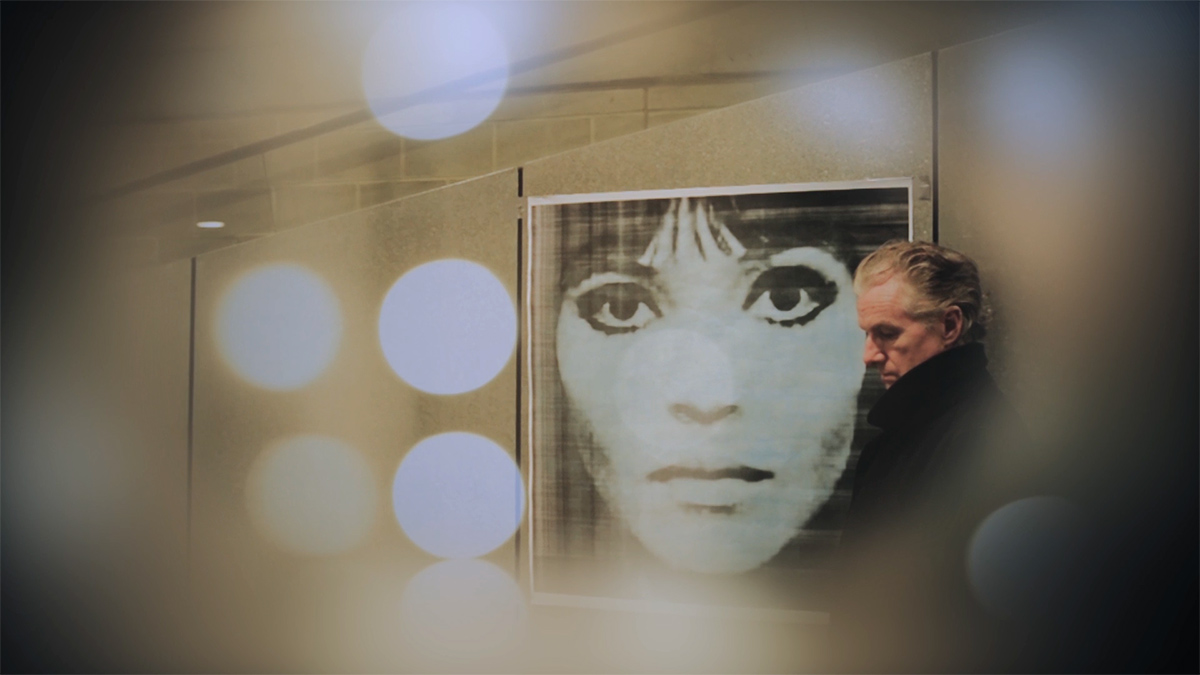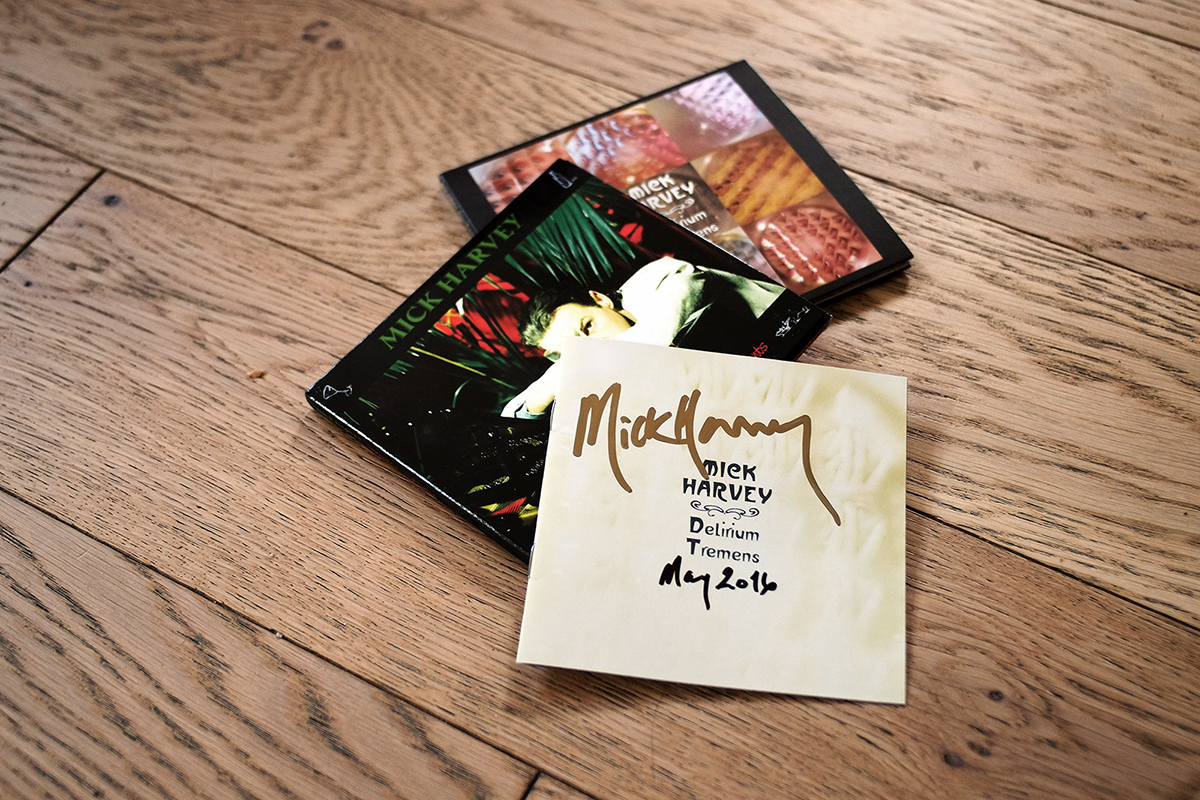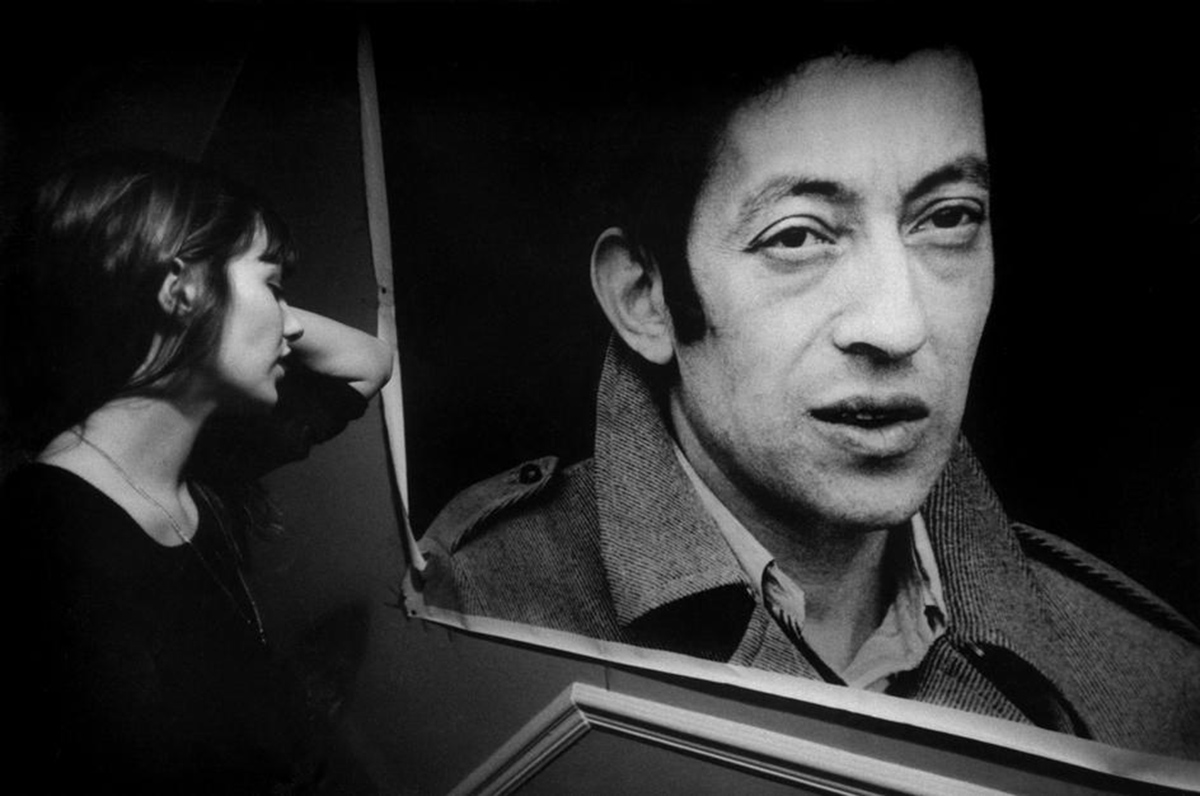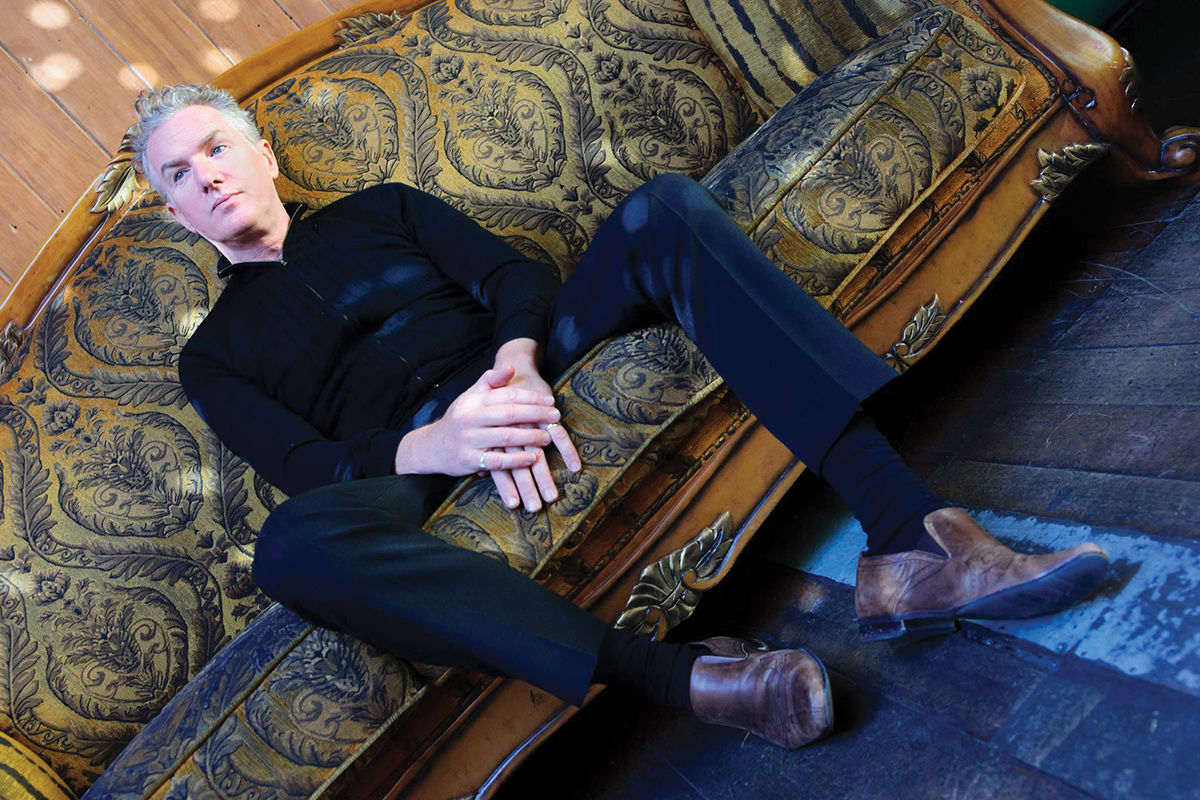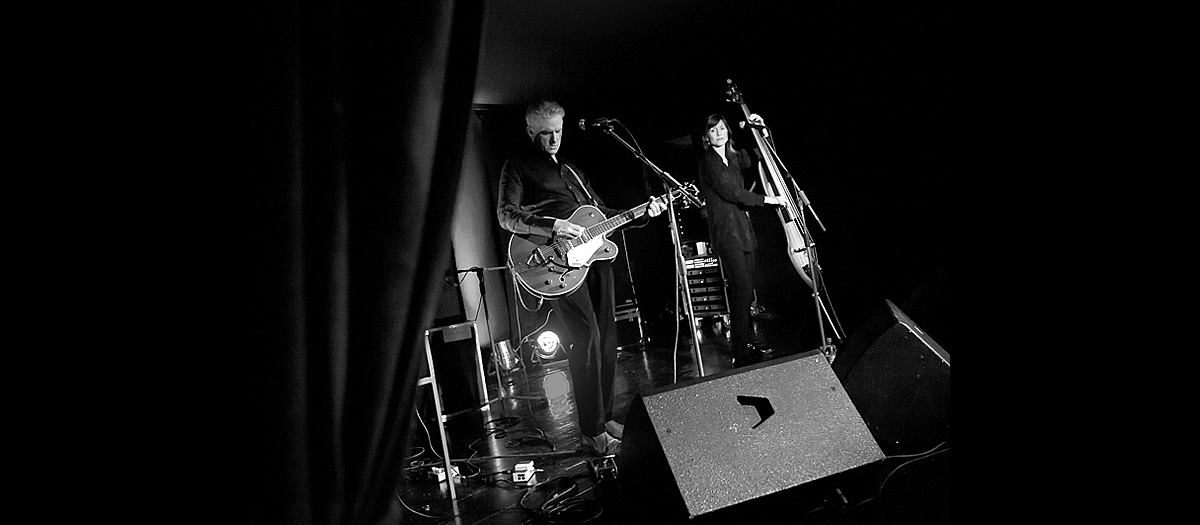In 1995, Mick Harvey releases his first solo album Intoxicated Man, today his album Delirium Tremens is the third homage to Gainsbourg. This is the crazy love story for this extraordinary genius, “enfant terrible” of French music.
Famous for his many collaborations with Nick Cave from the Bad Seeds —since their very beginning— then with PJ Harvey, the Australian Mick Harvey is a multi-talented genius: guitarist, pianist, singer, composer, sound technician, and producer. It’s only when I started working on my tribute to Gainsbourg’s screen print, that I discovered his fantastic covers and work of adaptations. A little late indeed, but I made up for it now with Mick’s new release (June) and for the next album to be released later this year (November).
What can be surprising at first, and what could be bothering more than one of Gainsbourg’s fan is the definitively pop tonality, Mick’s crooner’s voice, and the sometimes extremely faithful interpretation of the covers. On the one side, Gainsbourg never stopped to gently tease the British folks by combining the French and the English language to make the lyrics swing like he wanted to. From the 60’s, he even started punctuating his songs with small Anglicism; which had that clacking tone (Remington, Chewing-Gum, Juke-Box, Pick-Up, etc…). Serge with his strong French accent as flexible as a barbell, even tried a few English versions of his own songs like Bonnie & Clyde, or Sea Sex and Sun with Jane Birkin. Serge couldn’t care less: “excuse me, I’m a french man, and I’m afraid I don’t speak very well english but…” If Gainsbourg’s popularity was unavoidable in France, his international renown as a respected artist came to maturity much later. Now a source of fascination, he almost embodies to himself the chic eroticism, the dark humor, well everything that makes the “esprit Français,” and which pisses off the British so much.
Gainsbourg was known to invite English musicians (Arthur Greenslade from 1965) then American ones on his albums. Ironically, Mick beneficiated from the help of the French musician Bertrand Burgalat —for the translations and string arrangements— as well as from the American Toby Dammit (The stooges, The Residents). To succeed to Gainsbourg’s “babydolls,” we find here the pretty voices of Anita Lane, Katy Beale, and Xanthe Waite. We also find old friends on Mick Harvey’s albums: Warren Ellis and David McClymont. The title I love you… nor do I even offers a duo with Nick Cave!
Jane Birkin, London, 1970. Photo by Ian Berry.
Mick Harvey took 20 years and four albums to finish his project, a challenge that no one else would have had the courage to undertake. At the Birdland Studios, north of Melbourne (Australia) and then in Berlin (Germany), working on his arrangements, he succeeded the exploit to translate every word play, which is most often impossible to understand for a British guy. “I just wanted to show my work in a honest way, to give the most faithful interpretation, without betraying the author, the composer, nor the artist […] Translating a great writer is like walking through a minefield.” Far from being the wicked and provocative character that “Gainsbarre” was famous for, Mick Harvey is recreating the repertoire of a “classic Gainsbourg.” Serge, this unattainable classic icon of the French romanticism, was a fascination for Mick. He took a special interest in those songs written in the 60’s, which are far less well known. Indeed, it’s with these songs that Mick’s talent expressed itself the best.
You’re going to tell me: for a French person, it’s terribly difficult to be objective when it comes to English covers! Harley Davidson, Initials BB (even Iggy Pop broke teeth on his 2011 cover) or the famous “pornophonic” I love you, nor do I…, which can be translated in many different ways while still being impossible to grasp at the same time! Yes indeed, we are touching the untouchable! What else can we add to these huge hits? Covers can appear bland, definitely less exciting than the originals. Alain Bashung had accomplished a “tour de force” with a French cover of Variations sur Marilou) in L’Homme à la Tête de Choux (The Man with the Cabbage Head).
Though, there are quite a few successes, and not minor ones at that. With Mick, the ambiance cabaret in Intoxicated Man or in Chatterton is genially mean. The organ Hammond that we can hear in Anthracite or Torrey Canyon gets all entangled with the guitar lines and renew with the definitely jazz repertoire of Gainsbourg. In a crooner mode of Scenic Railway with a very Hitchcock little intro (listen to it, you’ll understand), Mick Harvey explores songs, which are less well known while creating dark and ecstatic atmospheres. The third album shifts gears to a sound more rock, with tracks like A Violent Poison (That’s What Love Is). Behind the riffs, Mick’s spectral voice rejuvenates the 1967 music-hall version (famously known as “spoken word”) by Serge Gainsbourg and Jean-Claude Brialy. On The Convict’s Song, the thrilling rhythm of the snare drum and the mesmerizing guitar wonderfully refreshes the Chanson du Forçat. In Envisage (J’envisage), how not to think of the deep and solemn voice of Leonard Cohen? The bass-guitar line fills the room while the tune drifts away, composed by Bashung.
Like Deadly Tedium (Ce Mortel Ennui), the transpositions are a perfect success since they seem to stick to Mick Harvey’s skin. Here, the piano turns piano-bar and with the vibraphone à la Gary Burton, the voice close to a whisper, the mischievous whistling, everything is perfect. We could almost even hear, in the reverberating melody, the sound of drinking glasses deep down underground, in a corner on the stage, smelling like old leather and cold tobacco. Now, the real “deadly tedium” took French leave with Mick Harvey. He had recorded the most vibrant homage to Serge Gainsbourg that an English man could ever do.
Photo © Alexander Hallag
Peter Walsh from the group The Apartments (for whom I made, with Pascal Blua, the artwork for two screen-printings, gave me the permission to contact his old friend Mick Harvey. He had the great kindness to answer my questions:
You mentioned, in one of your interview, that you were a “Gainsbourophile” (it means: absolute fan of Gainsbourg) later on in life. After 4 albums, I would have a hard time believing that you haven’t become an absolute fan by now!
Mick: I doubt very much that I would have said I am a Gainsbourgophile. This must have been either inserted into what I said by the journalist or been part of the journalist’s opinion. In fact I have a quite healthy disinterest in much of what circulates around Serge – his image, the anecdotes – really, everything that has little to do with his music. I am, as a musician and in the role of interpreting his music, primarily interested in what he has to offer as a songwriter.
Probably after 4 albums and the thorough investigation of his life’s work I should be less of a fan than I was when I was hearing his more favoured works back in the late 80s. In fact, I’m not “a fan” of things full stop. I find the whole notion ridiculous. Simply not my style.
In your choice of songs, I felt Nick Cave’s universe and your first album were crossing path in many ways, even more so with Intoxicated Man, Chatterton, Jazz in the Ravine, The Barrel of my 45. I love these songs; I think it is where Serge is the most cynical.
Mick: Those songs, yes, they carry a beautiful, laconic cynicism shot through with some deep, black humour. I enjoy that.
I created a serigraphy in homage to Serge and Jane. The background is made with some of the titles of his songs, which I found out are almost identical to the ones on your albums! There is no coincidence. Do we have a similar nostalgia of the same Gainsbourg, the one from the 60’s and 70’s? A cynical and playful dandy, refined provocateur, accompanied with some jazzy accents? or a charming gentleman with the Jean-Claude Vannier string arrangements’ style?
Mick: Actually, I would say his period between those bookends. After he moves away from the jazz stylings and before he engages with the “concept” albums and Vannier’s magic touch he is in a zone where the onus is on the artist to be original – the rules have disappeared, you know, 1967-1971. The whole world of music was operating like that at the time and Gainsbourg was always responding to the latest trends in his style, genre and production choices. In this regard he was a shameless magpie. But in this period he seems freed of those shackles, as the whole idea was to be freed of such shackles, and I think he produces by far his best work from an original songwriting perspective. This culminates in the Melody Nelson album but his best songwriting is in the lead up to that.
This is not to say I don’t like many of the songs he wrote earlier and even later but one often has to find the song through the distraction of the genre. I’m not a fan of genre music.
photo © Tomislav Sporiš
I believe you found the right balance, without trying to imitate Serge. I particularly love your deep voice, quite different from Serge’s voice, which can be slightly nasaly and sometimes off-key. You often choose to be more “pop” or “cabaret” than the 70’s originals. Is your latest album recorded in analogic with vintage instruments?
Mick: Well, I’m flattered and glad you like my voice but I must say I find Serge neither nasal nor off-key. I think his singing is excellent. I also don’t think my versions are more “pop” or “cabaret” but you are entitled to your opinion. The latest album was recorded digitally but as with pretty much all of my recordings it was made with a band playing live and playing fairly traditional instruments. And with the exception of one or two songs the takes were played freely, that is to say, without a click-track or drum machine. That’s the way I prefer to work.
To translate poetry, with Gainsbourg’s off balanced wordplay, must have been a real torture… There is nothing more difficult than to translate poetry from one language to another. It’s like translating John Keats, since it is so imbedded of subtleties. You must have made tremendous progress in French!
Mick: Translating poetry or lyrics is always fraught with problems. The primary problem is that one loses the sound and feel of the original language and the minute subtlety of meaning in those interrelationships. This is where much of the poetry lies so by making a translation in the first place what one inevitably loses is something of the poetry. Beyond that I just have to take a lot of advice and attempt to work in as much of the wordplays and internal cross-references that I can. Fortunately these are songs so I have strong guidelines which I must follow with the meter and with the rhyming schemes, which are indispensible musically. Then I have to retain the meaning, sometimes this can be a more subjective area open to different options. As you can see, I don’t take the job lightly. My French, however, has not made enormous progress. I still find it a very hard language to decipher aurally, unlike German, Italian and Spanish, but I have been speaking it a lot better lately.
Are there still any songs that you regret not interpreting yet? For example, I was thinking of Douze Belles Dans la Peau, Black Trombone, Requiem pour un Twister, or La Noyée.
Mick: La Noyée will be on volume 4 which will be released sometime in November. The other songs…..not so much. I like Black Trombone but to be honest I felt it hardly needed to be translated. There are so many songs. Where does one stop? Most likely with volume 4!!
So now that you’re done working on this fascinating album and finish touring with PJ Harvey, what do you see in your future?
Mick: I expect to be doing more relaxing and less and less “work” as the years progress but hopefully it will be more and more my own projects and becoming stranger and stranger. Then I might also have more time to engage with some of the problems in the world at the moment instead of just making music all the time.
Article by Stéphane Constant © 2016 Dezzig / french translation by Leslie Bilger.
Photo principale de l’article par Lyndelle-Jayne Spruyt
Excerpt from Interview in article: Les Inrockuptibles (1994, Christophe Conte) + Mute
Mick Harvey’s recordings are available on Mute website.
See also:
Sérigraphie Serge & Jane, 25 ans
The Apartments : A Tale of Two Cities


